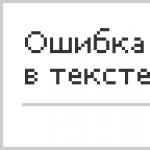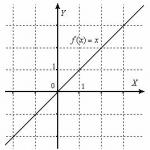They are trying to fire me under the article. How to fire an employee: options for terminating an employment contract and the procedure for dismissal. Possible reasons for dismissal
There are a number of reasons on which an employer can terminate an employment contract with an employee. All of them are described in detail in the Labor Code of the Russian Federation. However, it is not stated in direct text why one can fire an employee without his consent.
All grounds for termination of cooperation can be classified as follows:
- Worker's initiative.
- Leadership initiative.
- Some circumstances are beyond the control of either party.
Not all employers know why they can fire an employee who disagrees. The procedure is feasible due to the presence of certain facts:
- The employee lacks the necessary skills and qualifications.
- Low performance, inconsistency with the position held (confirmed by certification).
- Violations by an employee of established discipline.
- Systematic failure to fulfill duties prescribed by management.
- Absence from work without prior approval from management (absenteeism) for 4 hours or more.
- The presence of a worker at the workplace under the influence of alcohol or drugs.
- Administratively proven theft, damage or embezzlement of someone else's property.
- Disclosure of proprietary information or personal information any of your colleagues.
- Providing false documents during employment.
- If an employee with access to material assets committed any illegal act. Loss of trust in such an employee is also sufficient grounds for termination. employment contract.
The following situations can be designated as force majeure circumstances:
- Forced need to reduce staff.
- Liquidation of an enterprise (closing an individual entrepreneur).
The listed grounds for dismissal are regulated by the Labor Code of the Russian Federation (Article 81). In addition to the above, there are some other facts that allow you to terminate an employment contract unilaterally. These include:
- Change of management or owner of the enterprise.
- Gross violation by management or his deputy job description.
- Making a wrong decision, which caused damage to the organization’s property or its unlawful use.
The presence of any of these facts (or all of them at once) allows you to dismiss the head of the enterprise (additional office, branch), his deputy or chief accountant without their consent.
Any employee at public service He may also be removed from his post on the initiative of higher authorities. This occurs if the worker fails to comply with certain restrictions and prohibitions established by anti-corruption regulations, as well as if the assigned powers are exceeded.
Required papers
Upon dismissal, a worker has every right to request the following documents from the employer:
- Photocopy labor agreement.
- Order of dismissal.
- Photocopies of certificates indicating that the necessary contributions have been made (to the Pension Fund and other organizations).
- The original document that confirms the employee’s work in the specified organization in a certain position. In this case, the time period during which this interaction took place should be indicated.
If a worker is refused to provide any document, this can be regarded as a violation of the labor code. In this case, the dismissed person has the right to go to court.
Nuances that require close attention
In order for the dismissal of an employee to occur in accordance with the law, the manager should be guided by the fulfillment of two mandatory criteria:
- Correspondence real reasons for dismissal without the employee’s consent, as prescribed by the Labor Code of the Russian Federation.
- Unquestioning compliance with all necessary procedures.
If any of the criteria are not met, the employee can challenge his or her dismissal. In the event of liquidation of the enterprise, all workers must be notified in advance (at least 60 days in advance) of the termination of the contract. The same applies to cases of staff reduction in an organization.
You can warn employees either in person (by delivering the appropriate document) or through registered letter sent to the place of residence (if the reason for the employee’s absence is valid). Those who received a warning must sign for its receipt.
Sometimes an employee deliberately tries to avoid reading the specified paper. In this case, the text of the warning is read out loud in his presence. Next, you should draw up an act of refusal to familiarize yourself with the information. The paper must be certified by the persons who read the warning.
Employee incompetence
Sometimes the qualifications and skills of a worker do not correspond to the position he or she occupies. In order for the dismissal to be considered lawful, the organization’s management should conduct a certification of the team. If the commission considers the employee’s work to be insufficiently competent, the TD with the employee may be terminated. However, it will still be necessary to obtain and take into account the motivated opinion of the trade union body.
Avoidance of responsibilities
Those who regularly do not fulfill the tasks set by management and have already received a reprimand or reprimand for this matter are also threatened with dismissal. IN in this case it is a measure disciplinary action. To complete the picture, it is necessary to have complaints, explanatory notes, reports and other evidence of this fact.
Before you can dismiss, it is necessary to assess the misconduct that occurred. Within 2 working days, the employee must provide an explanation in writing. Please note: you cannot terminate your employment before the deadline. The fulfillment of this condition is regulated by the Labor Code of the Russian Federation (Articles 192 and 193). In case of refusal to write a paper, this fact should be documented with an appropriate act.
Disciplinary action cannot be taken against an employee if:
- The offense was discovered more than a month ago.
- The offense was committed more than six months ago.
The management of the enterprise does not have the right to independently find any employee guilty of damaging or stealing other people's things. Dismissal on the basis of this fact can be made after a corresponding court verdict has been issued or a resolution from an administrative body has been received. The same applies to the situation when a worker provides false documents.
If an employer decides to terminate a contract with someone from the team, he should adhere to some rules:
- Document the detected violation.
- Assess the severity of the identified violation.
- Comply with the deadlines necessary for applying the punishment.
Compliance of management's actions with accepted rules minimizes the risk of wrongful dismissal and, as a consequence, subsequent litigation.
How legal is dismissal?
The State Labor Inspectorate periodically checks to what extent the termination of the employment agreement was complied with according to the law. This may happen:
- As a result of the dismissal filing an appeal to the relevant authorities.
- At the request of the state prosecutor.
- As part of a planned inspection of the enterprise.
If, based on the results of the audit, it turns out that the worker was fired illegally, certain sanctions will be applied to the employer. Often an administrative fine is imposed on the organization and its management. In addition, the employer will be required to reinstate the employee and pay for his temporary absence from the workplace. Sometimes the court awards additional monetary compensation to the employee as payment for moral damages.
Note: administrative fines for management they are equal to 1-5 thousand rubles, and for an enterprise - up to 50 thousand rubles. In case of systematic violations, the employer may be suspended from his position for up to 3 years.
Having decided to dismiss an employee without his consent, the employer should take into account all the nuances of completing this procedure. Otherwise, the worker will be able to prove the illegality of the dismissal.
Almost every person at least once in his life worried that he might be fired from his job. Some people live in such fear all the time, both those who actually commit violations from time to time and conscientious workers.
Let's figure out why exactly an employer has the right to fire an employee and why not.
Dismissal due to staff reduction
First of all, it is worth highlighting the dismissal due to a reduction in the number of personnel. They resort to it when the management of an enterprise believes that maintaining a specific position or a number of positions is not economically profitable.
By and large, there is no personal fault in such dismissal of an employee, although managers sometimes use it to get rid of unwanted employees.
This type of dismissal is carried out entirely at the initiative of the employer. True, there is a limited circle of people to whom it cannot be applied. These are, for example, pregnant women, minor workers, single mothers. Enterprise managers cannot dismiss these and some other categories of persons from their jobs due to layoffs.
But at the same time, there is a much larger circle of people who are not subject to the ban on dismissal due to job cuts. For these workers, in order to avoid being laid off, it is very important to prove to the company administration the importance of their position, as well as the personal benefit that this employee brings to the organization.
That is, in order not to be fired due to layoffs, you first need to please the management of the enterprise and prove your importance.
And for the management of the company, the main thing to remember is that it is not a specific person who needs to be laid off, but a position. That is, after dismissing an employee due to layoffs, no one can be hired in his place, and this position must be removed from the staffing table.
Otherwise, such dismissal may be declared illegal by the court, and the employee will be reinstated at his previous place of work.
Dismissal due to termination of the enterprise's activities
If in the previous paragraph the employee could at least somehow influence the likelihood of his dismissal, then there is practically no way for an ordinary employee to prevent the loss of his job due to the liquidation of the enterprise.
Even if he makes every effort to work for the benefit and prosperity of the company, his efforts can bear real fruit and prevent the collapse of the enterprise only if other employees of the organization make similar efforts.
Dismissal for violation of labor regulations
Dismissal for violation labor discipline a fairly common method of dismissal from a position, which is often used in relation to negligent employees. So, under this clause, you can be fired for:
- regular lateness to work;
- absenteeism;
- appearing on the premises of an enterprise while intoxicated;
- theft of company property or embezzlement of financial resources;
- damage to valuables;
- disclosure of trade secrets to third parties.
A prerequisite for this type of dismissal is strict recording of all violations in accordance with the procedure established by law. It should be noted that the employee must be familiarized with each violation report personally. He should also be asked to provide a written explanation of what happened.
The employee has the right to choose whether to give an explanation or refuse to give it. True, the latter will be regarded as an admission of guilt. In case of refusal to give explanations, the management of the company must draw up a corresponding act with the signatures of witnesses.
If the employer made a mistake somewhere during the dismissal procedure, then in the future the dismissed employee, even if there are real violations, can easily be reinstated through the court.
Dismissal for inadequacy of the position held
But dismissals under this article are relatively rare, since it is quite difficult and problematic to prove the inadequacy of a particular person for his position. This requires the creation of a certification commission, which must determine whether the person’s abilities and knowledge meet the responsibilities assigned to him.
But even if the commission recognizes that a person is not suitable for the position, the employer is obliged to offer him another type of employment that will correspond to his professional skills.
And only if the employee refuses this offer can he be dismissed from work as a person not suitable for his position. However, dismissed workers can still challenge the decision of the certification commission in court and, thanks to its decision, be reinstated in the workplace.
Due to the complexity of the procedure and the lack of a guaranteed result, employers try to dismiss employees under other articles of the Labor Code, and dismissal for non-compliance with the position is applied to last resort when all other options have failed.
Amoral behavior

According to the current Labor Code, people can also be fired for immoral behavior. True, this clause can only be extended to employees of various educational institutions (schools, boarding schools, etc.) and is actually inapplicable to most existing professions.
As in the case of dismissal for violation of labor discipline, the essence of the immoral act is mandatory must be recorded in the appropriate act.
Refusal by an employee to perform his duties
If you refuse to fulfill the duties assigned to you by job descriptions, then the head of the enterprise has every right to dismiss you from work. In addition, according to the law, the employer has the right to change working conditions, in particular the work schedule, the list of duties to be performed, the amount of payment, and so on.
True, he is obliged to notify the employee about this two months before the start of applying the changes. If an employee refuses to comply with these requirements, he may be fired. This point also includes refusal to move to another locality if the organization you work for moves there.
Dismissal when the owner of the organization changes
If the owner of the company has changed, then he has the right to dismiss the management of the company: the director, his deputies, the chief accountant. This right of the company owner does not apply to ordinary employees or middle and lower management.
Besides, former management The new owner of the company is obliged to offer other jobs, and in case of their refusal, start the dismissal procedure.
Who should not be fired under any circumstances?

Labor legislation stipulates a list of persons who cannot be fired under any circumstances. These individuals include women expecting a child, minor employees of the enterprise, and trade union leaders. These workers can only be fired if the company is completely liquidated.
But this does not mean that they can afford behavior that does not correspond to the work schedule at the enterprise, or improperly perform their immediate duties, since the managers of the enterprise, in addition to dismissals, have tools that can influence a negligent employee. For example, a reprimand or deprivation of a bonus.
Until they return to work, persons who are on leave (tariff leave, at their own expense, maternity leave, child care, etc.) or on sick leave due to temporary disability cannot be fired. They can only be fired on the day they begin their duties.
In addition, there is a circle of people who cannot be fired due to layoffs, but can be fired on the initiative of the administration in accordance with another article. For example, for violation labor regulations. These include single mothers and women with children under three years of age. If the child does not have a mother, the same rule applies to any person who officially takes care of him.
Conclusion. As you can see, an employee can be fired from work for very different reasons. Sometimes these reasons largely depend on him (in case of violation of labor discipline), and in other cases they are absolutely independent (in case of liquidation of the enterprise).
But in any case, a qualified and responsible employee has a better chance of staying in his job than an employee who approaches the matter carelessly or violates the order established at the enterprise. Persons who are negligent in their official duties are the first on the list for dismissal in any organization.
Is it possible to fire an employee if he is on sick leave to care for a sick family member? - Yes, you can.
Is it possible to dismiss a minor employee at the initiative of the employer? – It is possible, but only with the consent of the labor inspectorate.
Is it possible to fire an employee for absenteeism if his employment contract does not indicate a specific place of work? - No you can not.
Labor legislation gives the employer the opportunity to dismiss employees on his own initiative. But in practice, personnel officers often forget that in addition to this right, they have a number of responsibilities that must be fulfilled in order to realize it. How to fire an employee correctly, avoiding mistakes? What should you pay attention to first of all? What difficulties can you encounter when dismissing an employee at the initiative of the employer?
When can an employer not fire an employee?
An employer does not have the right to dismiss an employee if:
- he is on leave (annual, educational, child care, leave without pay wages and etc.);
- he is on sick leave.
This rule applies even if the employee works from home or part-time. In addition, try not to forget that there are special categories of employees who either cannot be dismissed at all on the initiative of the employer, or for this a certain procedure must be followed (table on page 40).
Restrictions on dismissal of special categories of workers
Measure | Exception | Norm |
|
| Pregnant women | Liquidation of an organization | Part one art. 261 Labor Code of the Russian Federation | |
| Women with children under three years of age | You cannot be fired at the initiative of the employer | Liquidation of the organization; guilty actions of an employee | Part four art. 261TC RF |
| Single mothers raising children under the age of 14 or disabled children under the age of 18, as well as other persons raising such children without a mother | You cannot be fired at the initiative of the employer | Liquidation of the organization; guilty actions of an employee | Part four art. 261 Labor Code of the Russian Federation |
| Minor workers under 18 years of age | You can dismiss only with consent labor inspection and commissions on juvenile affairs | Liquidation of an organization | Article 269 of the Labor Code of the Russian Federation |
| Trade union members, elected trade unionists | You can dismiss under clauses 2, 3 and 5 of Part 1 of Art. 81 of the Labor Code of the Russian Federation only when accounting reasoned opinion trade union | If the trade union does not provide a reasoned opinion | Part two art. 82, 373, 374 Labor Code of the Russian Federation |
| Representatives of workers participating in collective negotiations and in resolving collective labor disputes | Can be dismissed only with the consent of the body that authorized them to represent | Guilty actions of the representative | Articles 39, 405 of the Labor Code of the Russian Federation |
What to do if you are faced with a difficult dismissal case?
Let's look at some of the most common and complex issues related to the dismissal of employees at the initiative of the employer.
Unsatisfactory test result (Article 71 of the Labor Code of the Russian Federation). Remember that you will not be able to dismiss an employee on this basis if:
- there is no provision for probation in the employment contract (in this case, the test is considered unspecified);
- the employer missed the deadline for notice of dismissalon this basis (dismissal will be considered illegal);
- the employer did not record the results of the work performed by the employee, did not evaluate its quality (that is, there are no documented grounds for dismissal).
Reduction of number or staff (clause 2 of part one of Article 81 of the Labor Code of the Russian Federation). It is also not possible to dismiss employees on this basis in all cases. For example, you cannot do this if:
- the reduction procedure was not followed (part three of Article 81, Article 180 of the Labor Code of the Russian Federation);
- the position subject to reduction is occupied by an employee who cannot be dismissed at the initiative of the employer (for example, a pregnant employee);
- the employer did not comply prerequisites necessary in order to dismiss certain categories of workers (for example, did not receive the consent of the labor inspectorate to dismiss a minor employee).
Attention!
Remember that it is not the employee who is subject to reduction, but the staff unit or position.
Example
Attribute LLC has a network of branches. Each of them has the position of a personnel inspector. But CEO decided what to do personnel records management will only be in the central office and the position of “HR inspector” in the branches needs to be reduced. In this regard, management issued an order to reduce the number of employees and handed notices of the upcoming dismissal to all employees. At the same time, there were no vacant positions in the branches.
Two days before her dismissal, Elizaveta Ivanchuk refused to sign the dismissal order. She motivated this by the fact that she alone is raising a disabled child at the age of five, which means she cannot be fired. And provided supporting documents. Therefore, after the new staffing table came into force, Ivanchuk continued to go to work and spend her time work time in the office, doing nothing. What should an employer do?
The General Director of Attribute LLC solved this problem as follows. He made changes to the previously issued order to reduce staff and returned her position to the branch staffing table. Thus, the employee was provided with work. In the future, she will be able to be offered vacant positions in order to transfer to new job, later reducing the position of HR inspector.
Related documents
Document | Will help you |
| Articles 39, 71, 75, 81, 261, 269, 336, 373, 374, 405 of the Labor Code of the Russian Federation | Clarify the grounds on which an employer can dismiss an employee on his own initiative, as well as find out about exceptions to this rule |
| Resolution of the Plenum Supreme Court RF dated March 17, 2004 No. 2 “On the application by courts Russian Federation Labor Code of the Russian Federation" | Resolve complex issues that arise when an employee is dismissed at the initiative of the employer |
One-time gross violation employee of work duties. Absenteeism (subparagraph “a”, paragraph 6, part one, article 81 of the Labor Code of the Russian Federation). It is impossible to dismiss an employee on this basis if:
- the employment contract does not indicate the working hours (since it is impossible to establish which days are working days for the employee and at what hour his working day begins, it cannot be proven that he was absent from work for more than four hours);
- the employment contract does not indicate a specific place of work (since workplace is not defined, then it cannot be proven that the employee was absent);
- it has not been proven that the reason why the employee was absent from work was unexcused;
- the employer did not carry out the disciplinary procedure or carried it out with violations (Article 193 of the Labor Code of the Russian Federation);
- the employee is absent from the workplace for a long time and the reason for his absence is not clear (Articles 81, 193 of the Labor Code of the Russian Federation).
Advice
Be sure to indicate in employment contracts with employees their place of work (the structural unit must be indicated in accordance with staffing table). This will help confirm the employee’s absence in case of absenteeism.
Example
Digital LLC has stores in many shopping centers in the city. In an effort to increase sales, the employer sends employees (sales consultants, cashiers) to different stores on different days, depending on where in currently workers required. In employment contracts, the employer deliberately does not indicate a specific place of work (store). One of the workers, cashier-seller Margarita M., was sent by verbal agreement to a store located in mall"Orchid". But it so happened that the worker went to the Lilia shopping center by mistake.
At this time, there was a large influx of visitors in the Orchid shopping center, whom the workers there did not have time to serve. As a result, the store did not make the profit it could have. The angry manager decided to fire Margarita for absenteeism. Two days later she was asked to review the dismissal order. Margarita refused to do this and turned to the labor dispute commission to protect her rights.
The commission supported the worker's position. The management had to cancel their dismissal order, since the employment contract with Margarita M. did not specify her specific workplace. This means that the fact of absenteeism cannot be proven.
Inconsistency of the employee with the position held or the work performed in the event of insufficient qualifications confirmed by the results of certification (clause 3 of part one of Article 81 of the Labor Code of the Russian Federation). It is impossible to dismiss an employee on this basis under several circumstances, for example, if:
- the organization does not have a certification provision;
- the employer violated the certification procedure (for example, did not create a special certification commission);
- the employee does not have a job description, and his employment contract does not specify individual responsibilities;
- the employee was not certified at all;
- the employer violated the dismissal procedure (for example, did not offer the employee another vacant position, to which it can be transferred);
- the employee belongs to the category of workers who cannot be dismissed on this basis (for example, women with children under three years old, single mothers raising a child under 14 years old, etc.).
Change of owner of the organization’s property (Article 75, paragraph 4, part one, Article 81 of the Labor Code of the Russian Federation). By general rule the employer does not have the right to dismiss employees on this basis. The exception is the head of the organization, his deputy and Chief Accountant. However, they should not be confused with the heads of branches and other separate structural divisions– such employees cannot be dismissed on this basis. In addition, the new owner loses the right to dismiss these employees if more than three months have passed from the moment he acquired ownership rights.
Disclosure of secrets protected by law, including personal data of another employee (subparagraph “c”, paragraph 6, part one, article 81 of the Labor Code of the Russian Federation). In this case, the employer must carry out a disciplinary procedure and apply punishment in the form of dismissal (Article 193 of the Labor Code of the Russian Federation). But an employee cannot be fired if the company does not have a list of information that constitutes commercial, official or other secrets, as well as evidence that the employer has developed means of protecting them.
Law against practice
On practice
The employer decided to dismiss employee Shpyneva for repeated failure to fulfill her job duties without good reason, since for several days in a row she took her lunch break an hour earlier (not from 13-14 o'clock, but from 12-13 o'clock). Although the manager had previously verbally agreed with her about what hours Shpyneva would have lunch (the employee’s lunch time is not specified in the internal labor regulations and the employment contract).
In law
In accordance with Article 189 of the Labor Code, labor regulations are determined by the internal labor regulations.
What happens if…
It will not be possible to dismiss an employee on this basis in this case, since neither the company’s internal labor regulations nor the employment contract indicate the employee’s lunch break time. But a verbal agreement with the manager cannot be taken into account.
Often, labor cooperation ends with dismissal at the initiative of the employer or the employee himself. If an employer decides to fire his subordinate, then he must do it not just like that, but on the basis of one of the articles of the Labor Code of the Russian Federation.
Which specific articles can be used to dismiss an employee? What are the stages of dismissal under the article? What should an employee do if they want to fire him under a false article against his will? Read in this article.
Forms of dismissal are regulated by the Labor Code of the Russian Federation. According to it, you can resign according to one of the following schemes:
- . Those. Both the employee and the employer agree to dismissal. The simplest and most “painless” dismissal procedure, accompanied by drawing up an application for dismissal by agreement.
- The employment contract has expired. In this case, the dismissal procedure may not begin unless one of the parties expresses a desire to take into account the timing of termination of business cooperation and begin the dismissal procedure;
- . In this case, the reason can be absolutely any;
In the first three cases, no serious disagreements usually arise between the employee and the employer. However, as for the fourth case, when the employer initiates the dismissal, it can cause serious consequences.
As a rule, having decided to get rid of one of his subordinates, the employer initially invites the employee to write a statement to (so as not to put a “shameful” mark on the work book) and if he expresses his reluctance, he is fired under the article.
Read about the cases in which an employee can be fired under the article in the next section.
Grounds for dismissal under article
According to the current norms of the Labor Code of the Russian Federation, the dismissal of an employee under this article can be carried out in the following cases:
- (according to the article). Example: a young, inexperienced employee was hired for a three-month trial period, after which the employer realized that new employee fails to cope with the assigned tasks. In connection with which the decision to dismiss is made;
- or bankruptcy of an individual entrepreneur(according to part 1 of the article);
- Reducing the workforce of individual entrepreneurs(according to Part 2 of Article 8 of the Labor Code of the Russian Federation);
According to the Law, if the dismissal of employees is associated with a reduction in the number of employees or the liquidation of an enterprise, the employer must notify all employees at least two months in advance (three, in the case of mass reduction working staff). In addition, the employer must inform all territorial labor exchanges about the upcoming layoff, indicating the details of all laid-off workers (profession, position, level of earnings).
- . Unlike the first point, where we're talking about rather, about an inexperienced specialist, at this point the employee may have extensive experience, but from a different field or insufficient to fulfill the specific goals set by his manager (according to paragraph 3 of part 1 of Article 81 of the Labor Code of the Russian Federation);
In theory, organizational leaders should organize regular advanced training courses for their employees. However, few employers do this, leaving workers unable to cope with the rapidly changing nature and practices of work. As a result, they are fired, replaced by younger workers with suitable modern style work qualifications.
An employer can dismiss due to insufficient qualifications only if the employee was previously offered another vacancy in the same organization corresponding to his current qualifications, but he refused to accept it.
- Change of leadership(according to paragraph 4 of part 1 of article 81 of the Labor Code of the Russian Federation);
Dismissal due to a disciplinary violation can be carried out within one month from the moment the offense was recorded (in some cases no later than one six months).
- Serious one-time violation of their job responsibilities (according to paragraphs “a”, “b”, “c”, “d”, “e” of paragraph 6 of part 1 of article 81 of the Labor Code of the Russian Federation);
According to paragraph “a”, dismissal under the article will follow if the employee is absent without giving a reason for a whole working day (more than four hours).
According to paragraph “b”, dismissal under the article will follow if the employee is under the influence of narcotic or psychotropic drugs at least once.
According to paragraph “c”, dismissal under the article will follow if the employee, being a civil servant, violates the confidentiality of state secrets or discloses them to lower-level employees who do not have access to them.
According to paragraph “d”, dismissal under the article will follow if the employee is caught stealing someone else’s (worker’s) property, damaging it or causing serious defects. This fact was recorded by the court as an administrative offense.
According to paragraph “e”, dismissal under the article will follow if the employee violated safety rules at work, as a result of which this led to an industrial accident and harm to the health of other workers. Neglect of safety rules, which did not lead to dire consequences, but potentially could, can also be a reason for dismissal.
- Incompetent attitude towards one's own labor responsibilities related to monetary or commodity turnover, in connection with which the employer has lost professional confidence in his subordinate (in accordance with paragraph 7 of part 1 of Article 81 of the Labor Code of the Russian Federation);
- Committing actions contrary to moral standards, if work activity the employee is related to education (according to paragraph 8 of part 1 of Article 81 of the Labor Code of the Russian Federation);
Example: a citizen working as a teacher allowed himself offensive (obscene language) towards his students.
- Decisions that resulted in damage to company property(according to paragraph 9 of part 1 of article 81 of the Labor Code of the Russian Federation);
- Falsification of documents during hiring(forgery of experience, someone else’s passport, fake educational certificates, etc.), (according to paragraph 11 of part 1 of Article 81 of the Labor Code of the Russian Federation);
Who cannot be fired under the article?
According to Part 3 of Article 81 of the Labor Code of the Russian Federation, it is impossible to dismiss the following categories of employees under one of the articles listed in the previous sections:
- Workers located at sick leave due to illness;
- Employees on vacation;
- Female workers during pregnancy;
Dismissal of the above categories of employees is permitted in the event of liquidation of the company. In this case, the dismissed employee receives material compensation equal to at least one month’s salary.
What to do in case of wrongful dismissal under article?
In case of dismissal for a reason not specified in the Labor Code or one that the employee did not commit, follows or the district court with the appropriate .
Read more about ways to combat illegal dismissal read .
In this case, it is thirty days from the day the employer announced his intention to dismiss the employee under one of the articles of the Labor Code.
After the court makes a decision, the employee can expect one of the following outcomes:
- Payment of material compensation for causing moral and material damage;






